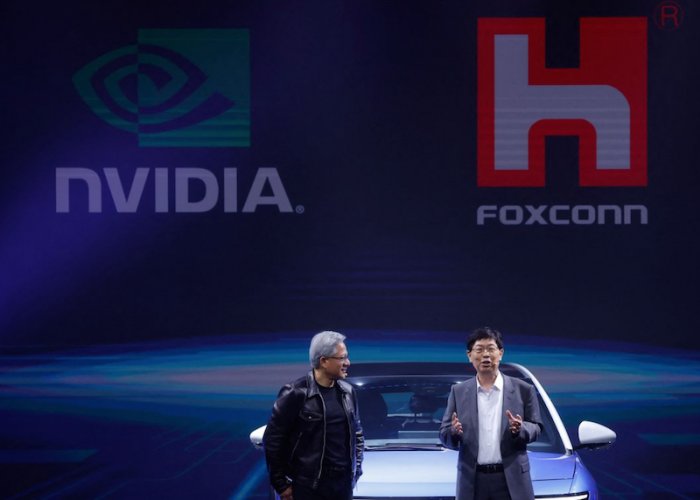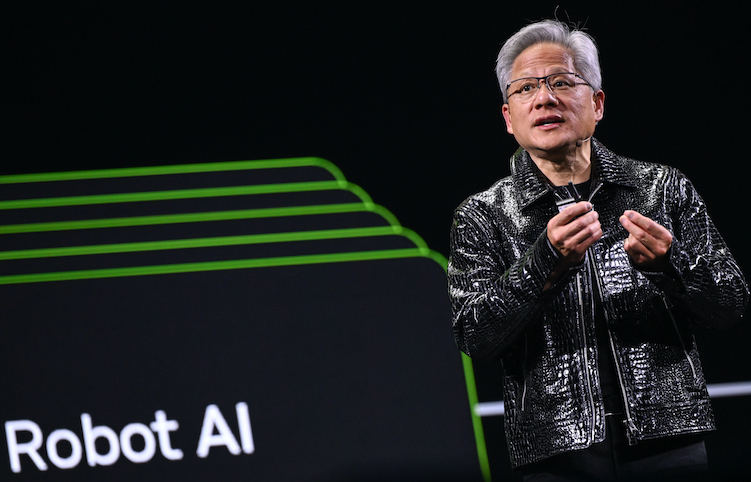US tech giant Nvidia – the world’s top designer of advanced AI intelligence chips – will work with Foxconn and the Taiwanese government to build an “AI factory supercomputer” on the island.
Chief executive Jensen Huang spoke at a tech hardware event in Taipei on Monday about the project, which is expected to cost hundreds of millions of dollars, given the high cost of the company’s advanced AI chips.
He said Nvidia also planned to build a new office, called ‘Nvidia Constellation’, in Beitou district in the city’s north, as “we are growing beyond the limits of our current office.”
ALSO SEE: TransPacific Cargo Surges on US-China Tariffs Backdown
A Foxconn subsidiary, called Big Innovation Company, will work with Nvidia – now a $3 trillion company – and the island’s government to build the supercomputer, which is expected to use 10,000 of the company’s Blackwell chips.
Huang, 62, a Taiwan-born American, said the supercomputer would use Nvidia’s latest chips to boost AI computing capacity and invigorate innovation by local researchers and companies.
‘Centre of the computer ecosystem’
He paid tribute to Taiwan, saying it was “the centre of the computer ecosystem” for decades and “the largest electronics manufacturing region in the world.”
Huang also announced a range of new products at the Computex tech hardware event, which the FT said was “aimed at embedding the company’s technology at the heart of an AI infrastructure industry that he predicts will be worth multiple trillions of dollars over the coming years.”
“It stands to reason that Taiwan – at the centre of one of the most advanced industries, the epicentre of where AI and robotics are going to come from – that this [convergence] is an extraordinary opportunity for Taiwan,” the South China Morning Post quoted him as saying.
The tech boss flew to Taiwan from the Middle East, where he and many other business leaders accompanied US President Donald Trump on a regional tour to Saudi Arabia, Qatar and the United Arab Emirates.
A host of huge deals involving Nvidia’s AI chips and data centres in these states, as well as the US, were agreed on over the past week.
Those projects help compensate the company for export controls imposed on sales of Nvidia’s most advanced chips to China and other ‘rival nations’, in a bid to limit their military forces’ access to the most powerful semiconductors.
With further restrictions imposed recently by the Trump Administration on its H20 chips, Huang has said his company is now “evaluating how best to address the China market.”
Meanwhile, Nvidia has pledged to spend up to $500 billion over the next four years on AI infrastructure in the US with partners such as TSMC, the world’s leading chipmaker, Wistron and Foxconn.
- Jim Pollard
ALSO SEE:
Trump Unveils Huge Chip Deals in Gulf After Rejig of Export Rules
Satellite Images Show Huawei’s Expanding Chip Facilities – FT
US Lawmakers Push Location-Tracking For High Powered AI Chips
Nvidia and China Tech Giants Hit by Latest US Chip Clampdown
Server Fraud Case in Singapore May be Linked to AI Chips, China
Trump Tells Apple CEO ‘I Don’t Want You Building in India’
Rogue Communication Devices Found in Chinese Solar Inverters
























